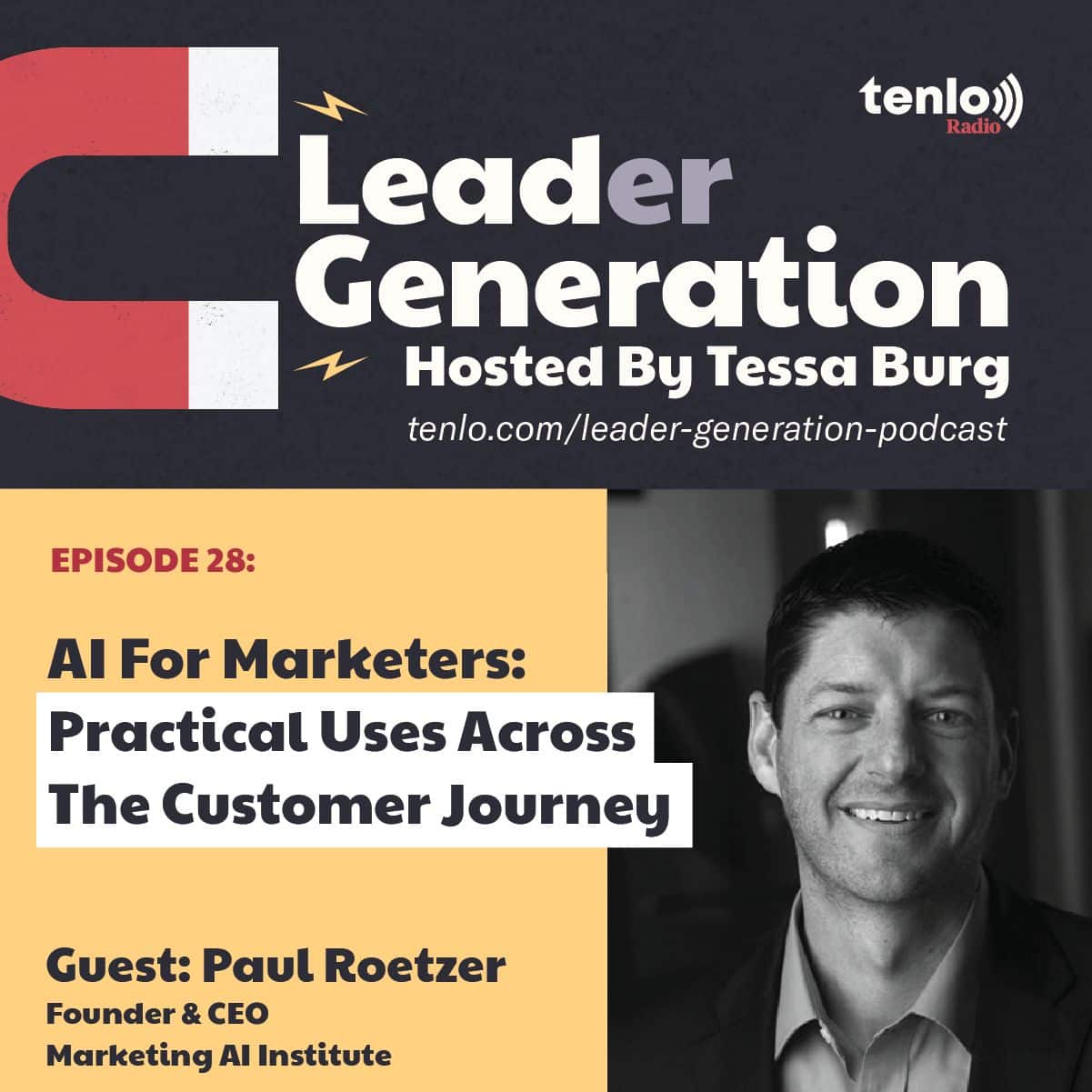Artificial Intelligence (AI) For Marketing
Panel Discussion
How well do you need to understand artificial intelligence to benefit from using AI in marketing?
Many marketers currently use AI and don’t even know it. For example, you may create lookalike audiences from CRM data in Facebook. That’s done using AI.
While you don’t need extensive knowledge of AI to reap its benefits, a base understanding provides inspiration. It enables you to see where AI may fit into your current process to automate tasks, increase productivity, identify patterns and make predictions.
To learn the basics, sign up for Intro to AI for Marketers [Live Class] through the Marketing Artificial Intelligence Institute.
Are there any AI applications that marketers can benefit from now?
AI can be applied to almost every aspect of marketing. From customer service to social media management, AI can automate repetitive tasks and save time and resources.
One place to start is an area where you inefficiently spend the most manual time. A good example is reporting and insights. You can get an out-of-the-box tool that can automatize insights using data collected from reporting.
Another example: chatbots. They’re becoming more common in e-commerce platforms. These bots allow customers to interact with brands through text messages. They also provide valuable insights into consumer behavior.
These are just two examples of AI solutions that are within reach for most marketing businesses.
How can we use AI to improve or speed up a test-and-learn marketing process?
Marketers who use AI tools are more likely to be successful because they are able to test more ideas faster.
For instance, we started out testing with A/B tests. Then we tried to isolate variables. Now we use AI tools to help us make decisions. In fact, we’ve used them to speed up our decision-making process.
We have to be careful though because sometimes we might not know the best strategy. So we need to test more than one idea at once. We need to test different messages, multiple channels, the right assets … basically, we need to test everything. And we need to test quickly.
So we use AI tools to automate some of those processes. And we can even use AI tools to tell us what to test next.
How can you prove that AI solutions are worth using?
Do a simple A/B test. Complete a marketing task using an AI application. Then complete the same task manually.
One you may want to try is LinkedIn Navigator. Use it to search for people who match your criteria. Does it produce more relevant matches than searching manually? Does it get the job done faster? Does it save you time?
Another place you can test is Google ads. AI-powered Smart Bidding allows you to test different bids and optimize campaigns based on real-time data. You can introduce an experiment to test this against a manual bidding strategy.
Running simple tests will help you determine if AI improves marketing performance and efficiency. It will also make it easier for you to sell the technology to your team.
How much should marketers invest in AI?
AI is about empowering marketers to deliver better results. While it’s an important part of marketing strategy, it’s not a silver bullet. AI should be used in conjunction with other strategies.
Don’t try to sell AI into your company on its own. Instead, focus on what you’re already doing well. Use free trials to test how AI-powered tools can help you do more of it. Then, measure the impact of the tools.
Once you see the benefits, you’ll be ready to invest in AI applications and integrate them into existing systems. How much you invest is up to you. But focus on adding only AI that’s tested and proven to deliver ROI.
Tessa Burg: Hello and welcome to the inaugural episode of Tenlo’s Office Hours. In this program, we are going to pick a topic and set up the situation around the topic as it relates to our clients, to generating leads, to being good marketers that support sales, and then we wanna hear from you.
Tessa Burg: What are the opportunities and the challenges that exist around this topic and what are some solutions that we can all start to use to make progress towards easing tension in the sales funnel, increasing engagement, and increasing conversion, or whatever your goals happen to be?
Tessa Burg: So, just today, we had a fantastic conversation with Paul Roetzer, of Marketing AI Institute, and he shared with us some examples of AI applications we can all start using, to accelerate our sales pipelines. We covered prospecting, we covered engagement and content and close in, so I think you’re really gonna enjoy today’s Office Hours.
Tessa Burg: If you have a question and you’re here live, go ahead, throw it in the chat, and we’ll answer it on the spot. And thanks for joining. All right. Let’s get started. Cheryl. I think that you have the first questions from the conversation we had about marketing and AI, you wanna kick it off?
Cheryl Boehm: Yes, absolutely. This first question that just came in is one I can personally really relate to. It’s, do you need to know all about AI in order to reap the benefits of it? So, I personally don’t consider myself a very technical person. So when we talk about technology, like AI can be a little intimidating. So how much does someone really need to know about what’s happening in the backend to really benefit from AI and marketing?
Tessa Burg: Yeah, that is a great question. ‘Cause I feel like there are a lot of feelings and emotions around AI. Either you think it might replace jobs, you think it’s sort of a waste of time and not proven out yet, or you think you have to have some skills in order to leverage it. And really none of those things are true.
Tessa Burg: So one, AI doesn’t replace jobs, it creates super humans. So machine learning, which powers the logic that gives us AI, does a better job than we can at identifying patterns very quickly. And it doesn’t mean your business intelligence department will be replaced or your research department, but it does mean that you can start to predict more accurately, and get learnings that you otherwise wouldn’t have been able to get from a human doing the analysis alone.
Tessa Burg: As far as really understanding how that all happens, it’s not necessary. And as we learned in the interview with Paul, we actually already are using AI and we might not even know it. So when you upload a CRM list of your sales team’s primary targets, Facebook can create a lookalike audience, and that is based on pattern recognition that it has built into its services. So that improves your targeting, it improves your fulfillment and engagement rate, and that’s something where it didn’t take the person running the campaign to actually understand what Facebook is doing on the backend, in order for the marketer to reap the benefits of higher click through rates, higher quality leads, and faster time to lead.
Tessa Burg: So I think that a base understanding always gives you the fuel you need to be inspired. So I would totally recommend that people check out marketingaiinstitute.com and do some of their free trainings.
Tessa Burg: There is also this great book that I read a few years ago. And even though it’s a few years old, it’s still hyper-relevant and it is called “AI For Marketers.” It is by Christopher S. Penn. And I might get the number of pages wrong, but if I recall correctly, it’s like 100 pages. It’s a very quick read or maybe I just enjoyed it so much. I finished it in one afternoon and I highly recommend starting there, because again, whenever you have that base understanding of just what are the benefits and the uses, can really inspire more ideas.
Cheryl Boehm: Excellent. Thank you.
Tessa Burg: Yeah. So on the phone today, in addition to Cheryl, Cheryl is our co-host for our leader generation podcasts. We also have Tom Madrilejos, who is one of our lead digital strategists, and Abbey, who is our digital coordinator, Abbey Holbrook. So thank you all for joining. Tom, did you have any questions coming in that you think would be good to address as a group?
Tom Madrilejos: Yeah, it’s kind of alongside of Cheryl’s question, where there’s a lot of sophistication and potential. An AI project could get extensive pretty quickly. From your experience, are there any applications of AI and marketing that you think are within reach for a lot of businesses and for your customers in the near term?
Tessa Burg: Yeah. So I think where you should start is where a couple of, I guess, qualities, intersect.
Tessa Burg: So one, where you might be spending the most time manually and it hurts. The easiest way to get buy in, especially from other people who might be involved in the decision-making process, is that the pain is real, and the pain needs to be addressed.
Tessa Burg: So a good example would be reporting and insights. Typically, I mean, you can get an out of the box tool that can leverage the data that you’re already collecting from reporting and start to automate those insights.
Tessa Burg: We actually have, at Tenlo, a client, who built a tool that does that specifically for the CPG industry, it’s called Bedrock Analytics. And it takes the data that you already have about your products, and empowers the sales team with the exact insights they need to sell into more retailers, and really win at the shelf.
Tessa Burg: So that’s a great example of, again, the sales team does not need to be experts in AI. It’s super complicated on the backend of Bedrock Analytics, but it’s something that is already happening at a lot of food companies. They’re preparing all these presentations; they’re trying to manually collect this data.
Tessa Burg: And that’s an example of you can plug that in, configure it, it still takes obviously some people, strategy, and process to get that first iteration up. But then once it’s up, you’ll let the machine learning algorithms learn what’s best, based on patterns and behavior.
Tom Madrilejos: Yeah, that makes a lot of sense. That’s great.
Cheryl Boehm: Here’s another question I’m seeing is, how can we use AI to improve or speed up a test and learn process? And I’ll give a little context here, in case any of our participants didn’t hear the entire episode. There was a conversation and Paul mentioned how sometimes people think that marketers need to have all the answers and that’s not true. And that marketing is trial and error, and test and learn. And so how can we use AI within that process?
Tessa Burg: Yeah, I think that’s a great question. So there are, when we first start testing, we like A/B tests, and we try and isolate variables. And when you are looking at not being able to control the target audience, when you’re looking at running several tests, all in a row, if you implement an AI tool, then what the real strategy is, the people power, is do I have the right assets? Am I testing different enough messages? And have I created experiences and drive traffic to the experiences that I believe will convert?
Tessa Burg: But then let the algorithm, multi-variate testing powered by machine learning is a great example, run that test for you. It will expedite the insights that you get, and it will also increase the accuracy.
Tessa Burg: So we, people can really only see, like here’s what I wanna test A, here’s what I wanna test B, and I know I wanna isolate these things. And something that Paul said in the interview that I thought was kind of funny, is that we have to accept that we at marketers kind of suck at strategy, and yeah, that’s true. I mean, we don’t have the capacity for machine learning, that’s why we teach machines, but we do have the capacity to teach, and we do have the capacity to create, and that’s what’s important, but using multivariate testing machine learning powered multi-variate testing, gets us away from this rural standard, A/B isolation thing that could take months and months, especially if don’t have a lot of traffic.
Tessa Burg: So whenever you stand it up, you know machine learning does require data. It does require a lot of traffic in order to work best, but at least you’re not leaving it up to guessing as to whether or not you selected the right variables to test.
Tessa Burg: Another one I was just thinking about, and this is kind of in line with that question, but I also see it here, is, how can I show that AI is better than not AI? That is fairly straightforward. I would again pick an application where AI is already running in the background, and that you can do like a simple test, run it without using a built-in method. So we also talked about, in the interview, LinkedIn Navigator. And so if you were to manually go look for people who match your criteria in LinkedIn, how long does that take you? What’s the quality of your results? Versus using LinkedIn Navigator, and the algorithms that run the background of that, now, how long are you looking? What’s the quality of your results? And compare, and then, bring that forward to other people on your team to start a show. When we take the time to test new applications and leverage this existing technology, here’s an example of results we can expect, in terms of quality, then also time savings.
Tom Madrilejos: I can add to that. I think that’s a great example from LinkedIn, and another place we see that marketers all the time, is with Google ads, where they introduced smart bidding several years ago. And of course, a lot of people were concerned about it naturally, that, what are these AI powered optimizations and bidding strategies exactly doing? Are they in the best interest of the client or ourselves and not the platform?
Tom Madrilejos: But over time, to this day we still run them against our own prescribed bidding strategy, but we’ll introduce an experiment with target CPA or target ROAS, and we’ll still have them running concurrently and choose the best one that’s getting the results we want, but it is still testing it against a more manual strategy.
Tessa Burg: Yeah. I love that recommendation, that’s another great way to show value and learn as you go too. Cheryl, do you have any other questions coming in?
Cheryl Boehm: Well, this one’s coming from me. What I wanna know is, you had this great conversation with Paul. What was your favorite moment in that episode or the key takeaway, that you would want to share with everyone, that you think was most beneficial, coming out of this episode?
Tessa Burg: Yeah, that is challenging. There were so many, what I liked the most, is that he gave exact examples of application that we as marketers can all try today. So, I would highly recommend, if you haven’t heard the episode go Tenlo.com, click podcast, and on the Paul interview, you’ll see the list of those applications.
Tessa Burg: I actually wrote down the one that I wanted to test on some of our enterprise clients. And he also gave a good metric for seeing if this tool fits for you, but it’s a MadKudu, and it’s an AI-powered lead scoring platform. So that’s been like a thorn in my side, is this manual scoring guessing game. I know you always needed a starting point, test and learn, but I feel like we spend a lot of time trying to pick numbers, and MadKudu will automate that process for you, and again, probably teach you something that you didn’t know. ‘Cause, back to the, we as marketers may not be the best people to set that strategy. So I’m really excited to try that.
Tessa Burg: I really appreciated that he gave examples and shared with us about the free training that’s on Thursdays, just half-hour webinars where people can start to get that base understanding and really get inspired. So let’s do one last question on this topic. And, Abbey, let me know if you see anything that comes in that we should end with.
Abbey Holebrook: Yeah, absolutely. So we do actually have a couple hits coming in into the chat. So, this one’s good. How much should we spend? How much should we spend on, like time on AI? How much money, anything in between?
Tessa Burg: Yeah, that’s a really common question. I feel like if you approach clients or as someone who’s on the brand side, when you approach your senior executive team, they will ask, “Well, what’s the ROI on this?” And I think the best place to get started is not to pitch AI, don’t pitch it separately.
Tessa Burg: So if your spend isn’t or shouldn’t be to start anything in addition to where you’re at, if you’re taking a first step, look at the platforms you’re already using, and are they powered by any machine learning and algorithms that you can start to test and simply do what you’re doing today, but a little differently?
Tessa Burg: The second step is now that I have seen some value and I’ve learned, are there applications that I can license? So that’s where the cost is gonna come in. But as Paul mentioned in our interview, a lot of them have free trials or demos. So you can use that free trial to start to build out that ROI calculation. But I think something that, with people being slightly intimidated by AI, that I would try to avoid, is saying, “We’re gonna test AI.” It’s like, no, AI is empowering you as a marketer to deliver better results.
Tessa Burg: So start there, with what are the outcomes. and then start with what’s in front of you to drive those outcomes, and then use that as proof points to build up, to show the ROI over time.
Cheryl Boehm: And I think that’s one great point from this episode is that Paul gave a lot of great starting points for some marketer who wants to try AI and start using it, but isn’t sure what that entry point is. And he gave lots of examples of where you can start.
Tessa Burg: Yeah, I totally agree. And if you’re like, “Well, I don’t know if we are using it, “I don’t know if my agency is,” ask, I’m sure Tom will be able to tell you. ‘Cause again, you might not even know you’ve started and maybe you already have bigger ideas, and you might already have the proof you need to license additional application and expedite some other processes.
Tessa Burg: All right. Well, that is all for today’s Office Hours. Thank you for everyone who joined live and submitted questions. We will be doing this every other week. So on the weeks that we don’t have Tenlo radio episode, if you have a specific topic that you would like to discuss, you can go ahead, visit the Office Hours page on Tenlo.com and submit that. And if we get it scheduled, we will get back to you to let you know when that will be airing. Otherwise, register for future Office Hours, and we will talk to you soon in the future.
Panel Discussion

Guest Panel:
Cheryl Boehm | Director of Copywriting at Mod Op
Tom Madrilejos | Product Strategist at Mod Op
Abigail Holebrook | Ad Operations at Mod Op
Moderator:
Tessa Burg | Host of Lead(er) Generation | Senior Vice President of Technology at Mod Op
AI For Marketers: Practical Uses Across The Customer Journey

Learn the benefits of using AI in your marketing. Plus, how to use AI to generate leads and shorten the sales cycle for better business results.
Listen Now

